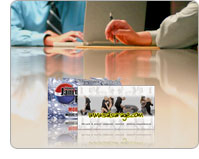- Products
-
Design Templates
- Featured Design Galleries
- More Galleries
- Services & Resources
- Free Sample Kit
- Deals

A business card is an integral part of any good marketing plan. For its size and cost, it's probably the most powerful marketing tool you have. A business card should present a professional image people will remember. After all, despite its small size, your business card can make or break a client's first impression of your company. In fact, a business card can influence your company's first impression perhaps as much as your personal appearance. Like your attire, your card style should be appropriate for your business, industry and personal style. Here are some things to keep in mind when creating your business card:
Basic cards: A basic card is usually printed in black ink on plain white or cream stock. This is a good style to choose when utility is all you need. It's a no-nonsense approach that will appeal to clients and prospects looking for just the facts. Picture cards: Having your picture printed on a card helps a contact remember you the next time they see you. Images that represent a product, service or a benefit your business provides can really help you communicate a complex business proposition or value. Die-cut cards: These cards stand out by featuring an unusual shape, edges or folds. Die-cut cards are generally more expensive than regular cards because they use nonstandard production processes, but, for some businesses, paying extra to really stand out may be well worth the price.
 Paper weight: Don't skimp when it comes to the quality of your business cards. A good, heavyweight paper stock, such as a 16-point paper stock, will feel substantial and pleasing to the touch. Also, a water-resistant coating will prevent having type bleed from contact with drops of water or moisture from a hand. A poor-quality card implies a business that will have poor-quality products and services. Color: Two-color cards are most common, but you can really spice up your business card with a splash of color. Restaurants often use red on their business cards as it's proven to increase appetites. Color may be an inexpensive way to make your card stand out; however, don't make the mistake of color overload. Too many colors that don't complement each other will make your card look busy and detract from your value proposition. Print type: Approximately 95 percent of the population aged 35 or older uses reading glasses. Make sure that your print type is not too small and can be easily read. A good guideline is to use a type size no smaller than 7 or 8 point. Your name print can be a little larger, such as a 9 point, for example. Quantity:The primary cost of printing business cards is the set up process. Therefore, it generally pays to print more cards than fewer, as the more cards you print; the less you pay for each card. Besides, the more cards you have, the more you can use them to generate prospects.
Paper weight: Don't skimp when it comes to the quality of your business cards. A good, heavyweight paper stock, such as a 16-point paper stock, will feel substantial and pleasing to the touch. Also, a water-resistant coating will prevent having type bleed from contact with drops of water or moisture from a hand. A poor-quality card implies a business that will have poor-quality products and services. Color: Two-color cards are most common, but you can really spice up your business card with a splash of color. Restaurants often use red on their business cards as it's proven to increase appetites. Color may be an inexpensive way to make your card stand out; however, don't make the mistake of color overload. Too many colors that don't complement each other will make your card look busy and detract from your value proposition. Print type: Approximately 95 percent of the population aged 35 or older uses reading glasses. Make sure that your print type is not too small and can be easily read. A good guideline is to use a type size no smaller than 7 or 8 point. Your name print can be a little larger, such as a 9 point, for example. Quantity:The primary cost of printing business cards is the set up process. Therefore, it generally pays to print more cards than fewer, as the more cards you print; the less you pay for each card. Besides, the more cards you have, the more you can use them to generate prospects.
PsPrint offers customers the opportunity to design their own professional business cards by utilizing online templates. Customers can select from a variety of business card templates appropriate for their business and then customize the card with their information. There is no charge for using the online design tool. Customers only pay to have their cards printed. PsPrint also offers graphic services. For a low, fixed fee, the professional designers at PsPrint will create a unique design perfect for your business. By having your business cards designed by the same company handling the printing, you are also assured of accurate printing with no hassles.